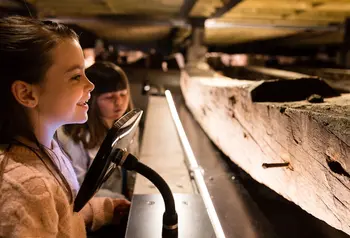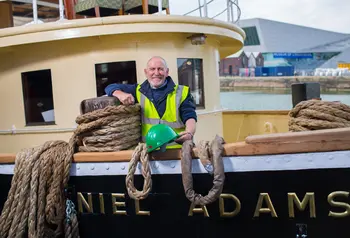Changing lives: research gives Tony a surprise

Tony Gutteridge, now in his seventies, also helped what is now Chatham Historic Dockyard develop new working practices to take advantage of skills offered by disabled people.
The Chatham Historic Dockyard Trust (CHDT) was seeking to enlist volunteers to research details of past shipbuilders as part of an HLF-supported project called Command of the Oceans. Tony read about it in his local newspaper in early 2015 and was immediately interested. He contacted the Trust but pointed out that, as a result of a motorcycle accident several years earlier, he now used a wheelchair so would probably not be able to visit the dockyard itself.
New discoveries
“If the research involved researching at home online or using spreadsheets I would be very happy to oblige,” Tony explains. “As an ex-Chatham dockyard apprentice of the early 60s, I am interested in the history of the ‘yard’ and thought it would be great to find out more of the dockyard’s past.”
“As an ex-Chatham dockyard apprentice of the early 60s, I am interested in the history of the ‘yard’.”
Tony
Paul Barnard, CHDT Fundraising and Stakeholder Relationship Manager, takes up the story: “As a lot of the work our volunteers do revolves around working in historic buildings and more specifically, buildings that are not normally open to the public, we do have some issues around gaining access to workspaces,” he explains. “We wanted to work with Tony as he was highly enthusiastic about joining the team so we developed a programme of work for him that allowed him to undertake this research at home – something that is completely new to us as well.”
So Tony got to work as one of a number of volunteers looking into the dockyard workforce at a particular point in history: 31 March 1803. Information sourced from original paybooks had to be collated and converted into a more usable form, namely spreadsheets. And then efforts were made to discover more about the individuals concerned.
“I don’t know why but for some reason I love spreadsheets,” says Tony. “The challenging part was being able to read Georgian handwriting which is certainly different to today’s. Also some of the paybooks had deteriorated over the last 250 years so were difficult to read.” He adds: “I got a lot of pleasure in carrying out the transcription work and satisfaction in knowing I was helping on a very worthwhile project.”
Ancestors uncovered
And there was an unexpected bonus, says Tony, who had previously attempted to trace his family history in the Medway towns. “In fact, while transcribing the 1803 paybook I did indeed find two relatives, so this was very satisfying.” The documents revealed one Thomas Gutteridge described as a ‘servant’ (i.e. apprentice) house carpenter and a William Gutteridge - a shipwright caulker. They were crosschecked with baptism records in a local church.
“The Trust now know that in the future, if further similar projects are proposed, they can call on me to help.”
Tony
Tony’s involvement has had a lasting effect on the historic dockyard as well. Says Paul Barnard: “It has enabled us to develop systems of working that allow volunteers to work remotely if they are physically unable to access our workspaces. We hope to use the learning we have developed through working with Tony with other disabled volunteers in the future.”
As for Tony, he is now looking forward to other opportunities: “Now that I have successfully completed the work on the project, the Trust now know that in the future, if further similar projects are proposed, they can call on me to help,” he says.


